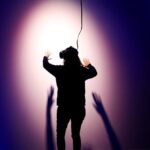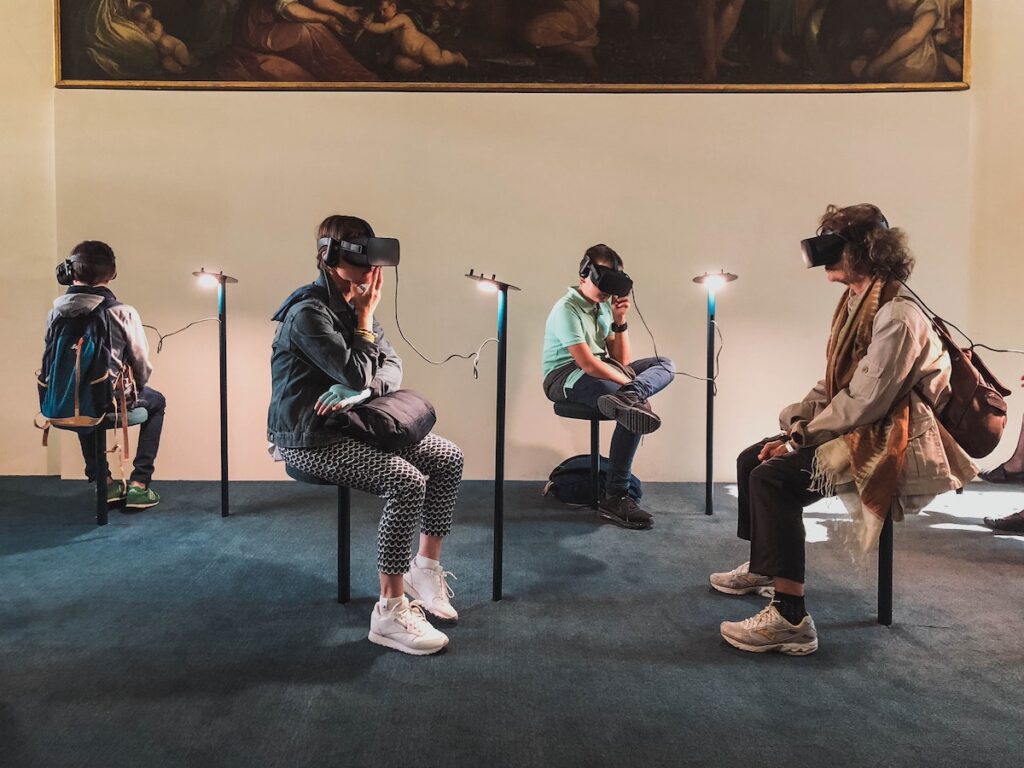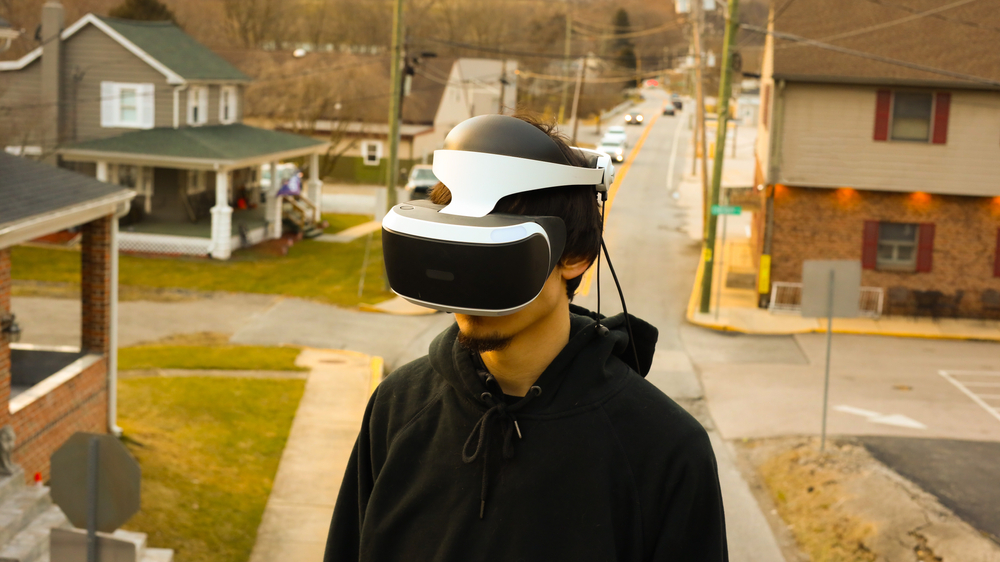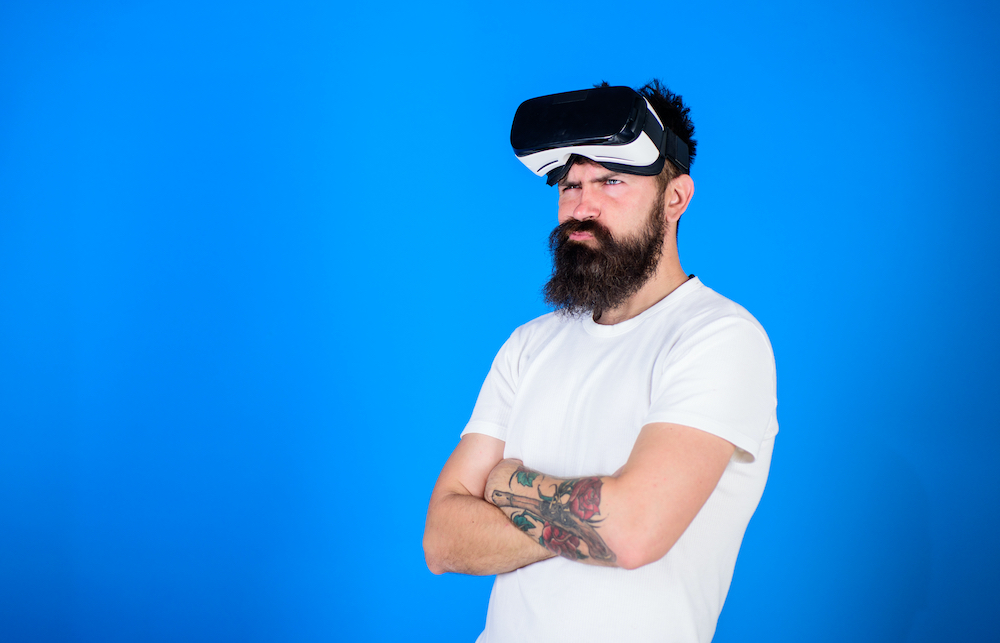
Social functioning is defined as an individual’s ability to fulfil their role within their environment, for example at work, during social activities, or in relationships with partners and family (Bosc, 2000). People with psychosis often experience impairments in this area, with psychosis being linked with social isolation (Velthorst et al., 2017) and reduced social networks (Gayer-Anderson & Morgan, 2013). These can negatively affect recovery, and consequently, long-term prognosis.
Research has started exploring the effect of virtual reality (VR) in social functioning in psychosis since VR has demonstrated promising effects in reducing distress when people experience delusions (Freeman et al., 2016) or hallucinations (Leff et al., 2014). A recent systematic review led by Dr Simon Riches is the first to assess VR-based assessments and treatments for social functioning impairments in psychosis (Riches et al., 2021).

People with psychosis often experience social functioning impairments which can negatively affect their prognosis. This systematic review is the first to assess Virtual Reality-based assessments and treatments for social functioning impairments in psychosis.
Methods
The following databases were searched: PsychINFO, MEDLINE, Embase, Web of Science, Cochrane Library, and Scopus.
Inclusion criteria for experimental studies:
- used VR apparatus;
- involved interaction in a VR social environment;
- assessed or treated at least one indicator of social functioning in individuals with a psychotic disorder (or ultra-high risk of psychosis);
- ≥5 people in the clinical sample;
- published in English in a peer-reviewed journal.
Exclusion criteria for experimental studies:
- predominantly assessed or treated social anxiety or phobia;
- unpublished dissertations or conference proceedings;
- abstracts without accessible full article text.
Data on the country, sample size, social functioning domain, test group, control group, sample summary characteristics, apparatus, VR environment, VR task, measures, number of sessions, follow-up time, and findings were extracted. Articles were summarised using a narrative approach, and their quality was examined using the Effective Public Health Practice Project Quality Assessment Tool (Ephpp, 2010).
Results
108 studies were screened for eligibility, and 58 met the inclusion criteria. This resulted in a total of 1,570 people with psychosis, most diagnosed with schizophrenia. The studies were conducted in Europe, Asia, the US, or Australia.
Researchers separated studies that used Head-Mounted Display (HMD) Screens and Immersive 2D Screens. HMD uses headwear that occupies the participants’ entire field of vision and embodies an avatar. Whereas Immersive 2D Screens use one or more LCD screens with a computer or projected display, which only occupies a proportion of the participants’ field of vision. Both VR hardwares use virtual social environments, such as neighbourhoods.
Safety and acceptability
Individuals with psychosis found the use of HMD and Immersive 2D Screens safe and acceptable to use. Further, they engaged well in the social environments and believed they appeared realistic.
Head-Mounted Display (HMD) screens
During the HMD studies, participants were invited to, for example, interpret social cues and interact with avatars.
Regarding assessment, HMD studies would typically have 1-2 sessions that involved a brief VR task to assess social functioning. People with psychosis displayed various indicators of social functioning impairments, for instance, reduced eye gaze.
Regarding treatment, HMD studies would have between 1-16 sessions that were cognitive behavioural therapy based. Some would also include follow-up sessions. These studies generally revealed that HMD positively impacts the following social functioning domains: anxiety, paranoia, safety behaviours, verbal communication, social skills, and delusional conviction.
Immersive 2D screens
During the Immersive 2D screen studies, participants were typically invited to, for example, complete activities of daily living.
Regarding assessment, all immersive 2D studies included a single session with a brief VR task to assess social functioning. It was indicated that individuals with psychosis displayed various indicators of social functioning impairments, for instance, emotion recognition difficulties.
Regarding treatment, studies would typically have between 1-12 sessions. All the studies reported that VR treatment positively impacted the following social functioning domains: positive and negative symptoms, memory, attention, social performance and functioning, cognitive functioning, executive functions, problem solving, categorisation, self-efficacy, and job interview-based role plays.

This review suggests that VR assessment and treatment of social functioning in psychosis may be a promising avenue to follow.
Conclusions
VR-based psychological assessment and treatment may be a potential way to help individuals with psychosis improve their social functioning. Further, given that improvement of long-term prognosis remains a challenge for current treatments available, VR environments targeted for social functioning impairments show promise in enhancing prognosis.

The authors suggest that VR treatment may be effective, safe, and acceptable for social functioning impairments in people with psychosis, but more and better research is needed before we can be confident of these findings.
Strengths and limitations
This systematic review utilised a comprehensive search strategy by searching across six databases, ensuring that the most relevant studies were identified. The review also included studies with both HMD and immersive 2D screens, which allowed the investigation of the effectiveness of different modes of VR. In fact, the validity of the findings obtained is enhanced provided that 81% of the included studies were deemed as high quality when assessed using the Effective Public Health Practice Project Quality Assessment Tool. Considering that social functioning impairments are highly prevalent in people with psychosis and can severely impact their quality of life, this being the first systematic review to provide evidence of treatment for social functioning impairments is a crucial step in helping those with psychotic disorders get the treatment they need.
Nevertheless, there were limitations present. The generalisability of the results is limited due to various reasons:
- Most of the research was conducted in western countries,
- Most participants were diagnosed with schizophrenia, therefore, findings may not be applicable to people with other psychotic disorders, and
- Most individual studies had small samples.
Beyond the issues of generalisability, there were also threats to validity present:
- Firstly, even though a large proportion of the included studies (84%) had a control group, most of them followed a case-control design with health controls. The latter fails to account for any confounding factors, such as the effects of the duration of illness or the use of antipsychotic medication.
- Secondly, there was a wide range of social functioning measurements used throughout the studies, for example, questionnaires assessing safety behaviours and verbal communication. Therefore, the studies were heterogeneous, which may affect the accuracy of the results obtained.
- Thirdly, there was a lack of blinding when assigning participants to the conditions in many individual studies; this could increase the chance of bias.
- Lastly, many studies did not report the proportion of participants who dropped out. If many people dropped out, this could highlight the limited acceptability of VR.

Research shows the promise of VR for social functioning impairments in psychosis, however, future studies should address observed methodological limitations to ensure generalisability.
Implications for practice
Within mental health settings, it is often infeasible to help clients directly in the environments they struggle in socially. However, it is generally best to visit the environment during the therapy session to practice techniques. VR provides a feasible way to visit different environments and could make therapy more generalisable to the real world.
Given VR’s flexibility in terms of VR environment settings, assessments and treatments can be personalised for each service user allowing more targeted help.
In many mental health services, there is often a shortage of highly trained mental health practitioners. In VR there is typically a virtual coach who can provide service users with ideas of psychological techniques. Therefore, less trained staff could be present instead, which can ensure that more people can access treatment.

VR assessments and treatments offer a range of benefits, including real-world generalisability and flexibility.
Statement of interests
None.
Links
Primary paper
Riches, S., Pisani, S., Bird, L., Rus-Calafell, M., Garety, P., & Valmaggia, L. (2021). Virtual reality-based assessment and treatment of social functioning impairments in psychosis: a systematic review. International Review of Psychiatry, 1-26.
Other references
Bosc, M. (2000). Assessment of social functioning in depression. Comprehensive Psychiatry, 41(1), 63-69.
Ephpp, P. (2010). Quality assessment tool for quantitative studies. Hamilton: The Effective Public Health Practice Project. http://www.ephpp.ca/PDF/Quality%20Assessment
Freeman, D., Bradley, J., Antley, A., Bourke, E., DeWeever, N., Evans, N., … & Clark, D. M. (2016). Virtual reality in the treatment of persecutory delusions: randomised controlled experimental study testing how to reduce delusional conviction. The British Journal of Psychiatry, 209(1), 62-67.
Gayer-Anderson, C., & Morgan, C. (2013). Social networks, support and early psychosis: a systematic review. Epidemiology and psychiatric sciences, 22(2), 131-146.
Giacco, D., Palumbo, C., Strappelli, N., Catapano, F., & Priebe, S. (2016). Social contacts and loneliness in people with psychotic and mood disorders. Comprehensive psychiatry, 66, 59-66.
Leff, J., Williams, G., Huckvale, M., Arbuthnot, M., & Leff, A. P. (2014). Avatar therapy for persecutory auditory hallucinations: What is it and how does it work?. Psychosis, 6(2), 166-176.
Velthorst, E., Fett, A. K. J., Reichenberg, A., Perlman, G., van Os, J., Bromet, E. J., & Kotov, R. (2017). The 20-year longitudinal trajectories of social functioning in individuals with psychotic disorders. American Journal of Psychiatry, 174(11), 1075-1085.
Photo credits
- Photo by Joshua Sortino on Unsplash
- Photo by Stella Jacob on Unsplash
- Photo by Lucrezia Carnelos on Unsplash
- Photo by Laurens Derks on Unsplash

‘Living in the head’ was labelled as Schizophrenia, Hallucinations, Delusions, OCD and many other. But perhaps in the present days we are encouraging ‘living in the head’ via virtual realities.
There are many adults and children struggling to connect with the reality, living in their own skin but using the virtual world to cope with struggles in life or mental conditions.
This is already here and perhaps where we all will be in the future?! It is sad but perhaps a dark reality.
Or is it an attempt to normalise the mental health conditions? Perhaps this could lead us to have better understanding of mental illnesses? Embrace the conditions?! Come to terms with it through ‘our children’, future generation, because we are so impotent in dealing with it on our own?
Or perhaps life is about survival for many?!
There is certainly a shift in the society, where we are finding our own ways to cope & mange mental health issues.